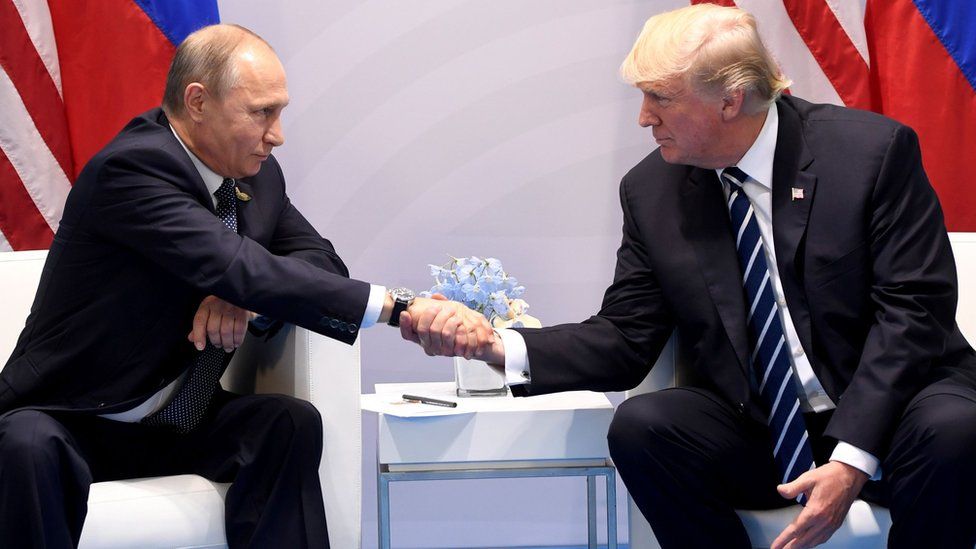US moves one step closer to imposing fresh Russia sanctions
- Published

The US House of Representatives has voted to impose fresh sanctions on Russia, despite President Donald Trump objecting to the legislation.
Senior officials will be targeted in retaliation for alleged Russian interference in the US 2016 election.
The bill is likely to complicate President Trump's hopes of improving relations with Russia.
Russia said the vote could destroy the possibility of "normalising relations" between the two countries.
The bill needs to be passed through the Senate before it can be sent on to the president to be signed.
The White House says it is reviewing the bill, and it is unclear whether the president will veto it.
"While the president supports tough sanctions on North Korea, Iran and Russia, the White House is reviewing the House legislation and awaits a final legislative package for the president's desk," White House spokeswoman Sarah Huckabee Sanders said in a statement.
Russia's relationship with the president has dogged his first six months in office, amid allegations Moscow interfered to help Mr Trump get elected.
All you need to know about the Trump-Russia investigation
Mr Trump has also piled pressure on his attorney general over the Russia inquiry. He has publicly labelled Jeff Sessions "weak" and said he was "disappointed" in Mr Sessions' decision to recuse himself from the investigation.
What does the bill do?
The legislation, which passed by 419 to three, was described by House Speaker Paul Ryan as a sanctions package that "tightens the screws on our most dangerous adversaries in order to keep Americans safe".
The sanctions on Russia were drawn up in part to further punish its annexation of Crimea from Ukraine in 2014. If passed, they would:
- Penalise firms, including those in Europe, that contribute to Russian energy development, affecting companies involved the Nord Stream 2 pipeline from Russia to Germany
- Shorten the duration of loans to Russian banks and Russian oil and gas companies
- Freeze assets of state-owned mining and railway companies
- Codify existing sanctions to make them more difficult to lift in the future
- Stop President Trump being able to singlehandedly ease the sanctions
The US already has a range of sanctions in place against Russian individuals and companies over Crimea.
In December, following claims of election hacking, then-President Barack Obama expelled 35 diplomats and closed two Russian compounds in the US.
The bill will also see fresh sanctions against North Korea and Iran over ballistic missile tests.
But the new measures against Russia have been criticised in Europe. A spokesman for the Germany foreign ministry expressed concern on Wednesday, saying US politicians were conducting industrial policy under the guise of sanctions, according to Reuters.
Analysis: Lawmakers wary of Trump's pro-Moscow stance
By Barbara Plett, BBC state department correspondent
The legislation codifies sanctions imposed by Barack Obama over Russia's Ukraine interventions, which would make lifting them more difficult.
It also expands restrictions on doing business with Russian companies, in particular on energy development. That has the Europeans very worried they'll be penalised for supporting Russian pipeline projects.
But what concerns the White House is a measure that limits the president's traditional right to waive the sanctions: he would be forced to consult congress first. That and the broad bipartisan support for the legislation shows just how wary lawmakers are about Mr Trump's pro-Moscow approach.
The Senate had overwhelmingly passed an earlier version of the bill: the differences between the two have to be worked out before Mr Trump decides how to respond.
The White House has suggested the president may support the bill after some changes to the original draft, but he would have little room to manoeuvre anyway because Congress almost certainly has enough votes to override a veto.
What happens next?
This version of the legislation still needs to be approved by the Senate, but it is not yet clear when it will consider the bill.
But if it passes through the Senate mostly intact, the bill would provide a headache for President Trump, who has signalled a more conciliatory approach towards Moscow.
If the two chambers pass similar but slightly different bills, a committee will draw up a compromise version for approval.
Once both House and Senate have approved a bill, it goes to the president to be signed into law.
What are Trump's options?
The president could veto the bill, but in doing so would fuel suspicion that he is too supportive of the Kremlin, correspondents say.
The bill has widespread support from both major parties in both Houses - making a veto a potentially unpopular political move.
Additionally, a presidential veto can be ignored if two thirds of both the House and Senate vote to override the president.
White House spokeswoman Sarah Huckabee Sanders said President Trump is "going to study that legislation and see what the final product looks like."
How has Russia reacted?
Russian Deputy Foreign Minister Sergei Ryabkov described the vote as "a very serious step towards destroying the possibilities for normalising relations with Russia".
"What has happened goes beyond the realms of common sense," Mr Ryabkov told Russian media, adding that Moscow had already warned that sanctions from the US would "not go unanswered".
Russia had hoped that Donald Trump's election would produce a reset in relations, and that the economic sanctions imposed over its actions in Ukraine might even be lifted, reports the BBC's Sarah Rainsford in Moscow.
But Russian politicians argue that President Trump has been blocked in that - by a wave of "Russophobia" sweeping the US, our correspondent says.
The Kremlin continues to insist it did not interfere in the US elections. One Russian newspaper has described the latest sanctions as "punishment, without a crime".
Six months of Trump
Commander in tweets: What we can learn from Trump's Twitter
- Published20 July 2017
- Published14 September 2018
- Published12 July 2017